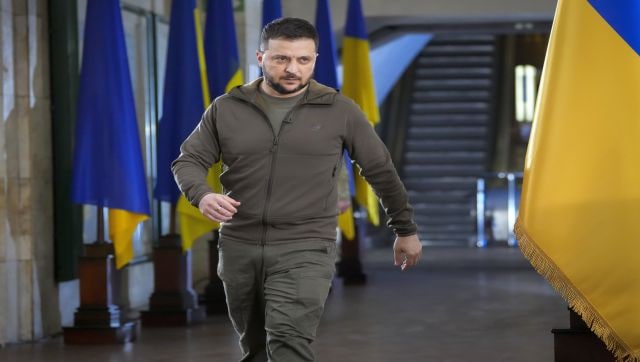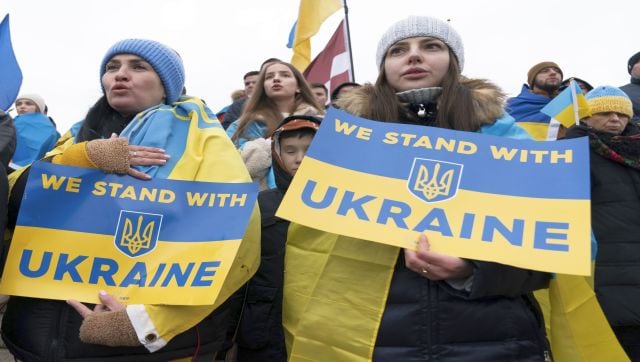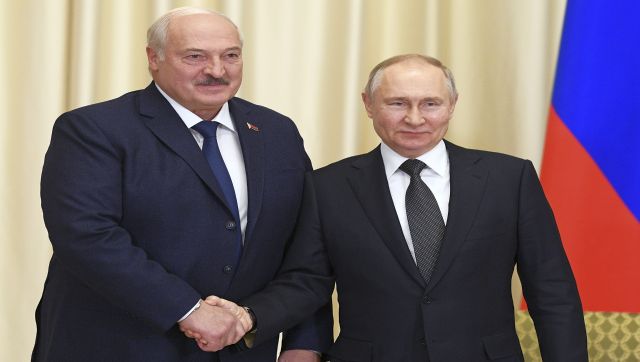It has now been over a year, 369 days to be precise, that Russia and Ukraine continue to battle one another in a war that is causing countless deaths and widespread destruction. As both sides refuse to back down — Russia’s Vladimir Putin seems to be upping the ante with taking stock of his nuclear arsenal — the war appears to be going nowhere with peace being a distant dream.
However, China has offered a 12-point proposal to end the fighting. The plan is part of Beijing’s efforts to present itself as a neutral peace broker and also cosy up to the European Union at a time when its ties with the West seem frayed and tensed.
On Friday (24 February), Ukraine president Volodymyr Zelenskyy said he had plans to meet China’s Xi Jinping to discuss its proposals to end the war. Speaking in a press conference, Zelenskyy said, “I believe that the fact that China started talking about Ukraine is not bad. But the question is what follows the words. The question is in the steps and where they will lead to.”
The Ukrainian leader added that he planned to meet with Xi and believed this would “benefit our countries and security in the world.”
But what exactly is China’s peace plan for Russia-Ukraine? Will it be the solution the world is looking for? How have other nations reacted to the proposal?
China’s peace proposals
On Friday, China released its position paper on the Russia-Ukraine war, in which it calls for a ceasefire and talks between the two parties. The proposal was timed to coincide with the first anniversary of Russia’s invasion of neighbouring Ukraine.
In its paper, Beijing wrote, “Conflict and war benefit no one. All parties must stay rational and exercise restraint, avoid fanning the flames and aggravating tensions, and prevent the crisis from deteriorating further or even spiralling out of control.”
The peace plan further states, “All parties should support Russia and Ukraine in working in the same direction and resuming direct dialogue as quickly as possible, so as to gradually deescalate the situation and ultimately reach a comprehensive ceasefire.”
“Dialogue and negotiation are the only viable solution to the Ukraine crisis,” it said, adding that China will play a “constructive role,” without offering details.
The plan, which was released by its foreign ministry, also urged Western nations to end its sanctions against Russia. Beijing wrote without naming the countries that they “should stop abusing unilateral sanctions” and “do their share in de-escalating the Ukraine crisis”. Furthermore, it called for the establishment of humanitarian corridors for the evacuation of civilians and steps to ensure the export of grain after disruptions caused global food prices to spike last year.
The proposal, without naming Russia or Ukraine, also stated that sovereignty of all countries should be upheld.
Beijing’s peace plan also stated that nuclear power plants should be kept safe and the threat or use of nuclear weapons should be opposed. “We oppose development, use of biological or chemical weapons by any country under any circumstances,” the paper said.
The proposal also called for an end to “Cold War mentality”. “The security of a region should not be achieved by strengthening or expanding military blocs,” the proposal stated.
Besides these points, the proposal also mentioned protecting civilians and prisoners of war, reducing strategic risks, keeping industrial and supply chains stable and promoting post-conflict reconstruction.
Ukraine’s response to plan
Ukraine’s initial reaction to China’s peace proposals were dismissive, reported news agency Reuters. A senior adviser to President Zelenskyy said any plan to end the war must involve the withdrawal of Russian troops to borders in place when the Soviet Union collapsed in 1991.
However, the president himself struck a more receptive tone to the proposal. He said, “I think that, in general, the fact that China started talking about peace in Ukraine, I think that it is not bad. It is important for us that all states are on our side, on the side of justice.”

Ukraine’s charge d’affaires in Beijing Zhanna Leshchynska also called it a “good sign” and said they expect China to be more active in its support of Ukraine. “We hope they also urge Russia to stop the war and withdraw its troops,” Leshchynska said.
Zelenskky added that his main goal was ensuring that China had not supplied weapons to Russia — a claim that the United States had made last week, stating that Beijing was considering ‘lethal aid’ to Moscow. China has denied this claim repeatedly since then.
“I really want to believe that China will not supply weapons to Russia,” Zelenskky said.
Earlier, Ukraine’s first deputy foreign minister told Al Jazeera that the country welcomes China’s proposal to mediate between Kyiv and Moscow. “We welcome any initiative that is actually aimed at finding peace and resolving the war,” Emine Dzhaparova told Al Jazeera from Kyiv. “We are the country that is most interested in having any kind of peace because we’ve been suffering this hell for a year.”
Also read: How India emerged as a peacemaker, while China’s neutrality became doubtful
West and NATO balks at plan
The Chinese peace proposal, which was hailed by Russia and cautiously welcomed by Ukraine, has been criticised by the West and its NATO allies.
One of the most vocal criticisms about the plan is that the document fails to acknowledge Russia’s violation of Ukrainian sovereignty.
US National Security Advisor Jake Sullivan, speaking on CNN, said China’s proposal should have ended after the first bulletpoint, which calls for “respecting the sovereignty of all countries.” “This war could end tomorrow, if Russia stopped attacking Ukraine and withdrew its forces,” Sullivan said. “Ukraine wasn’t attacking Russia. NATO wasn’t attacking Russia. The United States wasn’t attacking Russia. This was a war of choice by Putin, waged upon Ukraine.”
US’ secretary of state Antony Blinken reacting to the proposal said China is “trying to have it both ways”. “Publicly, they present themselves as a country striving for peace in Ukraine, but privately, as I said, we’ve seen already over these past months the provision of non-lethal assistance that does go directly to aiding and abetting Russia’s war effort,” he said to NBC News on Sunday.
When President Joe Biden was asked about it, he told ABC News on Friday, “Russian President Vladimir Putin’s applauding it, so how could it be any good? I’ve seen nothing in the plan that would indicate that there is something that would be beneficial to anyone other than Russia.”

NATO’s Secretary General Jens Stoltenberg wasn’t too receptive to China’s peace plan either. Speaking in Estonia on Friday, he said that said that China did not “have much credibility because they have not been able to condemn the illegal invasion of Ukraine.”
He added that Xi signed an agreement on a “limitless” partnership between China and Russia days before the invasion of Ukraine in 2022.
The European Union’s ambassador to China, Jorge Toledo, said the paper would be studied closely — but insisted it was not a peace proposal and did not mention an aggressor.
International security expert Li Mingjiang dismissed China’s proposal as an “attempt at public relations”, adding: “I’m not convinced that this policy is going to improve their credibility in being an honest broker.”
The 12-step plan has also been refuted by other international security experts with Thorsten Benner, director of the Global Public Policy Institute telling Deutsche Welle (DW) that Beijing speaks about sovereignty and territorial integrity, but China does not specify how this issue should be addressed. “China pays lip service to territorial integrity, but hasn’t called on Russia to stop its illegal war of conquest and withdraw its troops,” Benner told DW.
There’s also the claim that China can’t be a mediator as it is not impartial. Beijing has ties with Russia and the two nations have described their ties as a ‘limitless friendship”. Moreover, Xi Jinping is expected to visit Russia this year — mostly in April.
“It is foolish to believe that a party that is on the side of one player, namely China on the side of Russia, could play the role of the mediator. The same way Europe couldn’t be a mediator because it is firmly on the side of Kyiv,” Benner from the Global Public Policy Institute added in the DW report.
Bonnie Glaser, a China expert at the US-based German Marshall Fund also stated in a report published by The Guardian that China’s paper was largely a summary of its previously stated positions and statements, which were “replete with contradictions”.
Glaser said that in its plan China said that it stood ready to help in post-conflict reconstruction. “This sounds like China is keen to get its (state-owned enterprises) into Ukraine, both to make a profit and promote Chinese influence via commercial and economic means”.
Also read: Changing power equations in EU: NATO’s vulnerabilities exposed as Ukraine war turns one
Flurry of visits to China
Following China’s peace plan, there have been multiple announcements of meeting with China. France’s Emmanuel Macron on Saturday said he would visit China in April and urge Beijing to pressure Russia to end the war in Ukraine.
“The fact that China is engaging in peace efforts is a good thing,” Macron said on the sidelines of an agricultural show in Paris, in reference to the position paper.

Meanwhile, China has confirmed that Belarus leader Alexander Lukashenko will be making a state visit from 28 February to 2 March at Xi’s invitation.
Lukashenko is considered a long-time ally of Putin and has also allowed Belarus to be used as a Launchpad for Moscow’s actions in Ukraine.
Give peace a chance
China’s proposal for peace comes at an interesting time — many have questioned why Beijing wants peace now after a year of bloodshed.
Some wonder if China’s involvement is just an attempt to stay relevant. As Robert Hunter, a former US Ambassador to NATO told TIME magazine, “It could be just as simple as not wanting to be left out, saying, ‘Hey, we’re involved, we’re big boys, too’.”
A more practical reason for China’s involvement in the war now would be the re-energising of the EU and NATO. The longer the fighting continues, the greater chance there is that Russia will be unable to hold its seized territory. This would signify a waning sphere of influence across Central Asia.
Whatever the reasons may be for China’s involvement, the question now is will the countries finally give peace a chance?
With inputs from agencies
Read all the Latest News, Trending News, Cricket News, Bollywood News,
India News and Entertainment News here. Follow us on Facebook, Twitter and Instagram.
from Ukraine’s Volodymyr Zelenskyy to meet Xi Jinping after China proposes peace plan: What is Beijing’s 12-point proposal?




0 Comments